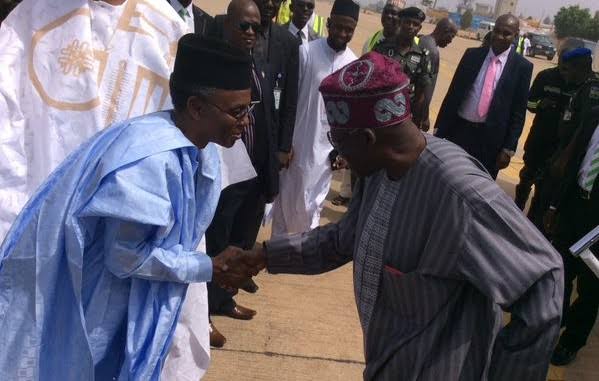
In a fresh twist to the silent row between the Kaduna State Governor, Mallam Nasir El-Rufai, and the National Leader of the All Progressives Congress, Asiwaju Bola Tinubu, the Kaduna governor has said Tinubu is not his man.
Speaking at a webinar in commemoration of the 63rd birthday of the Minister of Interior and former Governor of Osun State, Mr Rauf Aregbesola, on Saturday, El-Rufai, noted that Aregbesola remained his man any day but that Tinubu was not his man. This, he said, was due to the differences between him and the former Lagos governor.

The webinar was tagged, ‘Ogbeni Rauf Aregbesola Colloquium 2020,’ with the theme, ‘Government Unusual: Innovative economic solutions to unlock mass prosperity,’ and was moderated by Boason Omofaye.
El-Rufai’s statement came as a subtle confirmation of the disagreement between him and Tinubu. Both of them are stalwarts of the ruling party and are rumoured to have ambitions to contest the presidency in the 2023 elections.
Tinubu has never made any public statement about their seemingly frosty relationship and el-Rufai had also been conservative on the issue except for very few occasions.
Already, there had been mounting tension over which of the six zones would produce the next president in the 2023 elections.
Also in February, the Governor of Yobe State, Mai Mala Buni, while responding to fears that the APC might collapse when the President, Major General Muhammadu Buhari (retd.), leave office in 2023, said the much speculated presidential ambitions of El-Rufai and Tinubu could not break the APC, stating that it would rather strengthen the party.
At an event organised by the Bridge Club tagged, “An evening with His Excellency Mallam Nasir El-Rufai, Governor of Kaduna State, in May 2016, the Kaduna governor was believed to be referring to Tinubu when he explained how to end godfatherism in Lagos. Tinubu is widely known to be the godfather of Lagos politics since he left office as governor in 2007.
During the question and answer session, a Senior Advocate of Nigeria and three-time commissioner in Lagos State, Dr Muiz Banire, asked El-Rufai how godfathership could be dealt with given how it had served as one of the drawbacks for professionals and businessmen who might want to go into politics.
Responding, El-Rufai said he defeated and retired four political godfathers in Kaduna State, saying the feat could be replicated anywhere, including Lagos State. He stated that the key was to go back to the people directly, noting however that it was a step that required time and hard work. “The key is to go to the people,” he added.
But while eulogising Aregbesola during the webinar, El-Rufai said he was not ashamed to state that he copied the school feeding initiative in his state from Osun State when he visited Aregbesola as governor, adding that there was a lot governors could learn from the way he developed the state, in spite of the economic crisis that plunged the state into debts.
While congratulating the birthday celebrant, El-Rufai said, “I want to congratulate my brother, Ogbeni (Aregbesola), on his birthday. You know I’m your man any day. I’m not Asiwaju’s man and you are Asiwaju’s man, but I am your man any day. Asiwaju and I have differences but you and I have no differences.”
In his remarks, Aregbesola, who was visibly overjoyed by the contributions of the panellists and the eulogies he received from them, noted that his achievements as governor were driven by his passion for the people, a virtue he said he imbibed from his teenage years.
He, however, appreciated the President, Major General Muhammadu Buhari (retd), for encouraging him all along, adding that, “the second person who has played a very huge role in making me a good public administrator is Asiwaju Bola Tinubu. He takes all the glory, apart from God.”
Other panellists at the webinar were the governor of Kebbi State, Atiku Bagudu; Statistician General, Nigerian Bureau of Statistics, Dr Yemi Kale; the CEO, Financial Derivatives, Mr Bismarck Rewane; the Chairman, Citibank Nigeria; Dr Yemi Cardoso; the CEO, Lotus Capital Limited, Mrs Hajara Adeola; and the Country Director, Development Alternatives Incorporated, Dr Joe Abah.
Kale, in his submission drew a nexus between weak earners, larger households, especially in rural areas, illiteracy, lower education indicators and poverty. He proposed three solutions to address poverty from the state level, saying, “Address unemployment, increase formalisation of the informal sector and design appropriate tax systems to extract revenue from economic activities.
